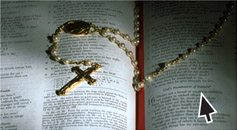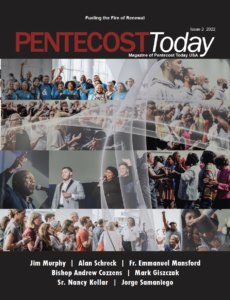The Holy Trinity
Meditation and Questions for Reflection or Group Discussion
Mass Readings:
- 1st Reading Deuteronomy 4:32-34, 39-40
- Responsorial: Psalm 33:4-6, 9, 18-20, 22
- 2nd Reading: Romans 8:14-17
- Gospel: Matthew 28:16-20
Knowing and Experiencing More Deeply the Great Love of the Trinity
I am with you always. (Matthew 28:20)
What do these four images have in common: 1) water, ice, and steam; 2) three keys on a piano played together as a chord; 3) a three-leaf clover; and 4) two eyes on a person’s head? If you guessed that these images have been used to describe the Holy Trinity, you’re right! These images are far from perfect, but each of them tells us something about the Church’s definition of the Trinity as three divine Persons in one God.
While we may have to use these inexact images to explain the Trinity, we don’t have to use them to describe how God’s love—these three Persons—wells up in our hearts.
The Father is always reaching out to us. His love is there for us whether we are apart from him, like the prodigal son, or whether we are there with him, like the son’s older brother.
Jesus showed the extent of his love by the way he gave his life for us at Calvary and by the way he constantly gives us himself to us in the Eucharist.
The Holy Spirit shows us his love by the way he teaches us and comforts us and guides us toward heaven. He is constantly filling us with God’s power to live holy lives.
Spend some time today praying about the Trinity. Ask the Father to fill you with his creative, parental love. Ask Jesus to fill you with the love poured out on his cross. Ask the Holy Spirit to fill you with the love of a Comforter and Advocate.
As you pray, look into your heart. See if you are being filled with Trinitarian love. See if you are getting a glimpse of the glory and humility and grace of the Trinity. See if you can sense a release of this grace as it draws you closer to God. Our God promised to be with us always. May we all come to know this truth more deeply!
“Lord, open the floodgates of heaven. I want to see you and feel your love.”
Download this reflection with discussion questions here.
(Many thanks to The Word Among Us (www.wau.org) for allowing us to use meditations from their monthly devotional magazine. Used with permission.)
Sunday, May 31, 2015
Questions for Reflection or Group Discussion
- In the first reading, Moses reminds the people of the great works that God performed to rescue them from slavery in Egypt and to form them into his people. He also reminds them that “so great” a work by God demands a response by the people: “This is why you must now acknowledge, and fix in your heart, that the LORD is God in the heavens above and on earth below, and that there is no other.” God has done an even greater work for us in rescuing us from slavery to sin and forming us into his people. What has been your response to this great work of God in your life? What has been your response to the incredible truth that God emptied himself and became man, suffered and died in our place, and sent his Spirit so that we could share his very life? How would you present these truths of God’s saving works through Jesus Christ to someone who needs to hear this “good news”?
- The Responsorial Psalm also describes the great works of the Lord and ends with this response by the psalmist: “Our soul waits for the Lord, who is our help and our shield. May your kindness, O Lord, be upon us who have put our hope in you.” What part of your life do you give to God, “who is our help and our shield?” In what ways do you sometimes withhold part of your life from God’s help and protection?
- The second reading says that we have not received “a spirit of slavery to fall back into fear” but “a Spirit of adoption, through which we cry, ‘Abba, Father!’” Because we are “children of God,” we can call God “Abba,” the Hebrew word for “daddy,” a term of love and childlike familiarity. Do you view God the Father as a loving and tender father or as a strict enforcer of his laws and commandments (like a cop in the sky)? What steps can you take to change any false images you may have of your Heavenly Father?
- The Gospel reading presents an expression of our faith in the triune God, in whose name we were each baptized. Have you ever reflected on the graces of God, received in the Sacrament of Baptism and through faith in Jesus Christ? In what ways should such reflections cause us to praise and adore God for showing us his mercy and giving us a share in his divine life? Are there some steps you can take to make these reflections a greater part of your daily times of prayer?
- The Gospel also includes Jesus “great commission” to the apostles to go and “make disciples of all nations.” What part, as baptized Catholics, do you believe we are called to play in this great commission to the Church?
- The meditation describes attributes of each person of the Trinity in terms of their love for us. It also describes our need to allow their love to “well up in our hearts”. What has God been teaching you this Easter season about his great love for you? What steps have you taken, or what additional steps can you take, to open yourself more to the great love of the Father, Son, and Holy Spirit — and to develop a more personal relationship with the Father who loves you? The Son who redeemed you? And the Holy Spirit present within you in power?
- Take some time now to pray for the grace to know and experience more deeply the great love of the Trinity. Use the prayer at the end of the meditation as the starting point.
[The discussion questions were created by Maurice Blumberg, a director of partner relations for The Word Among Us Partners, (http://www.waupartners.org/); a ministry of The Word Among Us (www.wau.org) to the military, prisoners, women with crisis pregnancies or who have had abortions, and college students. He is also a member of the National Service Committee Council of the Catholic Charismatic Renewal. Maurice was also the founding Executive Director of the National Fellowship of Catholic Men, for which he is currently a Trustee (http://www.nfcmusa.org/). He can be contacted at mblumberg@wau.org or mblumberg@aol.com.


 Click Here for us to pray for your intentions through our new website.
Click Here for us to pray for your intentions through our new website. 
